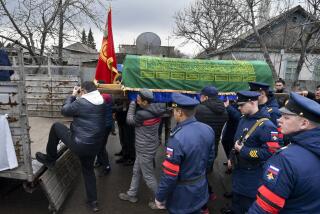Ethnic Turks Tossed Out of Bulgaria by Former Regime Are Wary of Returning
- Share via
ISTANBUL, Turkey — Sennur Kurkmaz is a 21-year-old ethnic Turk who was separated from her soldier husband of three months and deported from her Bulgarian homeland along with the rest of her family last summer. She now lives with an aunt, works a 66-hour week in an Istanbul bar for about $200 a month, and is helping her adolescent brother to get to college.
Despite her problems, Kurkmaz will not be tempted by offers from the new post-Communist Bulgarian government to return home. She hopes her husband will join her when his 2-year military conscription ends, but she has little faith in Bulgarian officials and wonders how long he will have to wait for his passport.
Kurkmaz was among an estimated 10,000 ethnic Turks thrown out of Bulgaria by the former hard-line Communist leader, Todor Zhivkov, in May and June last year. Their “crime” was to have opposed their enforced ethnic assimilation, which included bans on speaking Turkish, and practicing the Muslim religion, and the humiliation of having their names changed to Slavonic ones.
By Aug. 22, when the Turkish government closed its frontier with Bulgaria, another 320,000 ethnic Turks had voluntarily followed the Kurkmaz family in what became the greatest European population movement since World War II. About 130,000 subsequently returned, but exactly a year later Turkish Foreign Ministry sources estimate that over 1,000 a week have continued to receive emigration visas and settle in Turkey.
“We were made strangers in our own country because we had a Turkish ethnic consciousness,” Sennur Kurkmaz explained. “My life is difficult here, but I am accepted in Turkey and can live more freely.”
Kurkmaz’s views were echoed by many of her compatriots attending a gathering of Istanbul’s Balkan Turkish Cultural and Solidarity Organization. The president, Mehmed Cavus, explained that the organization was helping to overcome problems of integration for the new arrivals.
“We are helping with housing applications, job retraining, uniting divided families, and resolving outstanding problems left behind in Bulgaria,” Cavus said. “All retired people who came have lost their pensions and most people have lost their property,” he said.
The organization has helped nearly 1,000 immigrant high school children go on to universities. Others are benefiting from a second $10-million U.S. Agency for International Development grant for vocational training.
“We have 22 young people in a 4-month, full-time computer-studies course,” a committee member, Hanife Mutlu, said. “Our youngsters would not have had such chances in Bulgaria.”
Family tragedies are not scarce at the meeting. Habil Takavidov pleaded for information about the death last September of his 21-year-old army-conscript son, Hussein.
Takavidov, a former political prisoner, said that last year boys due for military service were refused exit visas by the Bulgarian authorities and they effectively became hostages. “I am too frightened to return at the moment and I only know from a relative’s letter that he died in hospital. I have no official information.”
There are few regrets among those who have settled in Turkey, although many speak warmly of their immediate Bulgarian friends. Hanife Yilmaz told how her Bulgarian neighbors had stored her furniture and other belongings when officials emptied her flat into the street after she fled last July.
“The authorities have now taken the flat back even though we paid our mortgage for 20 years and we have been offered no compensation,” she said. “My husband was shot during a human rights demonstration last May; he still cannot work and we will not risk going back in case he is arrested.”
More to Read
Sign up for Essential California
The most important California stories and recommendations in your inbox every morning.
You may occasionally receive promotional content from the Los Angeles Times.












